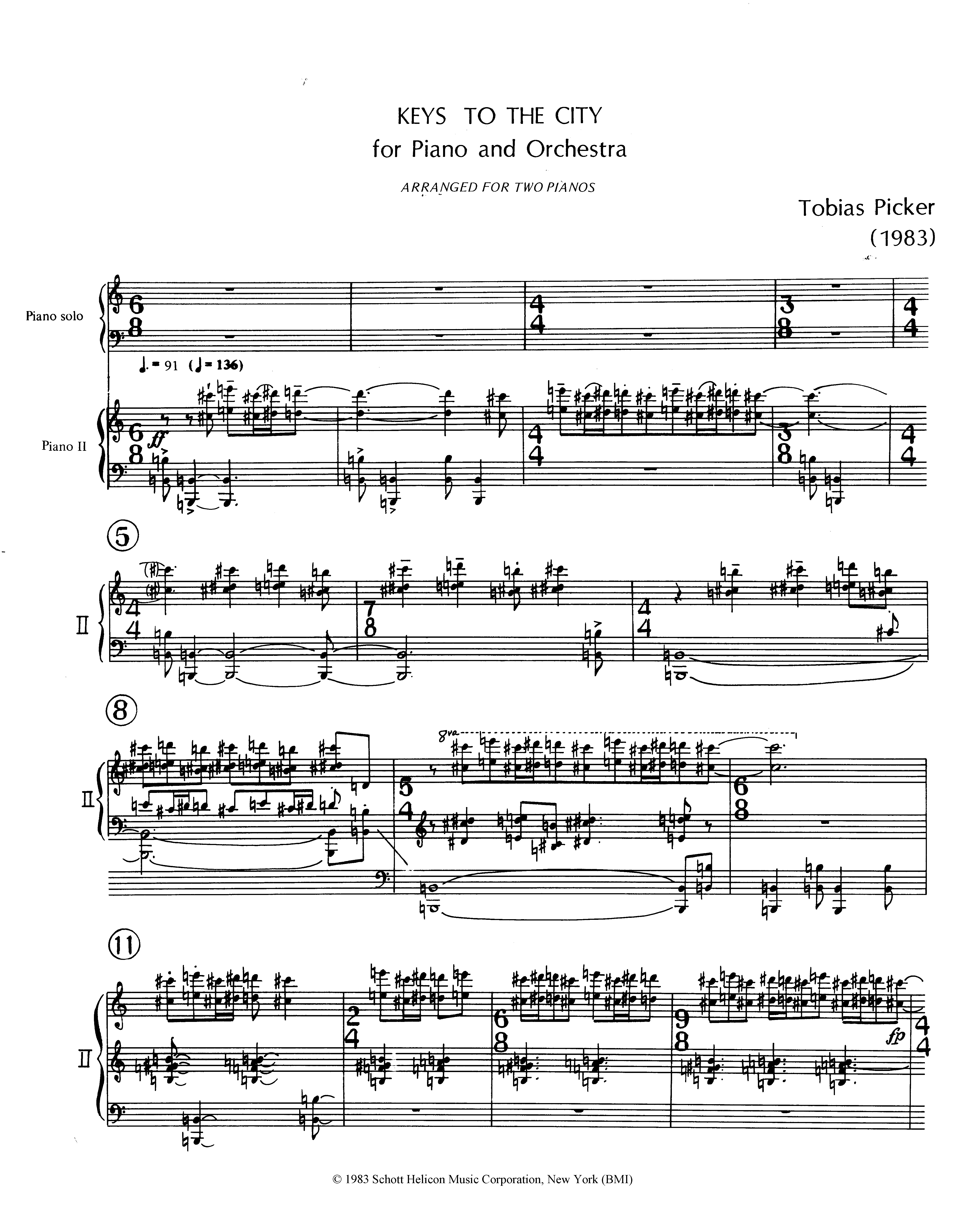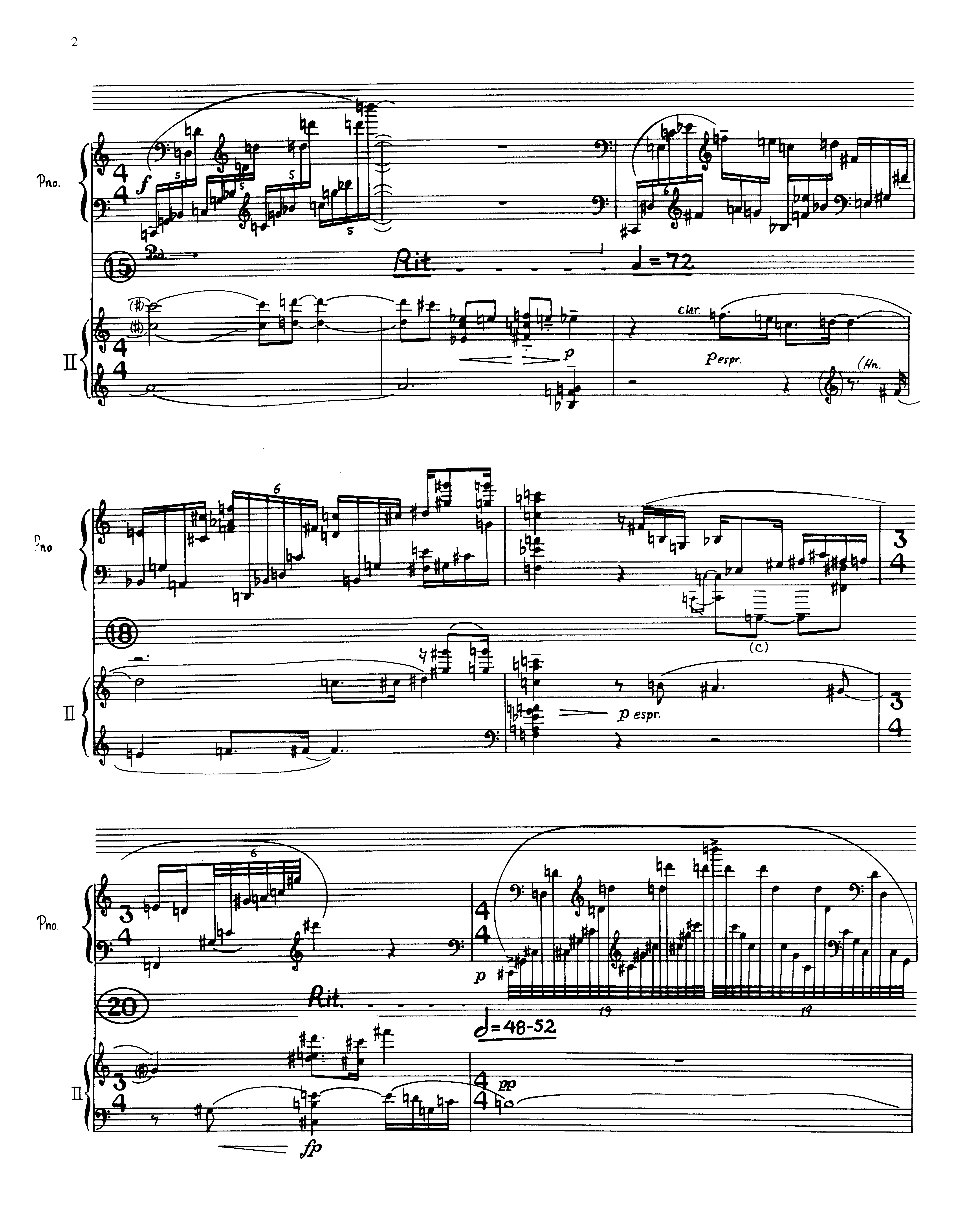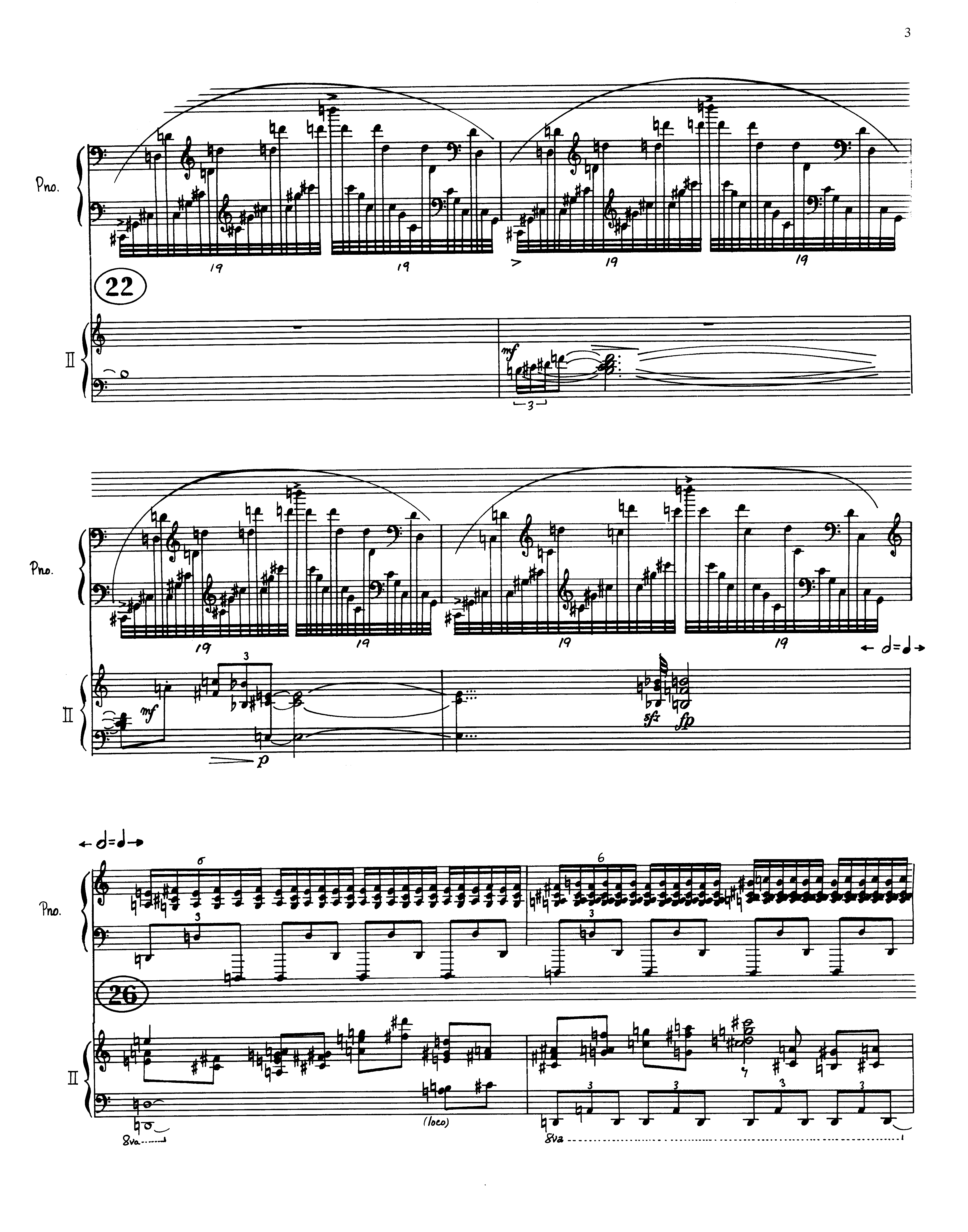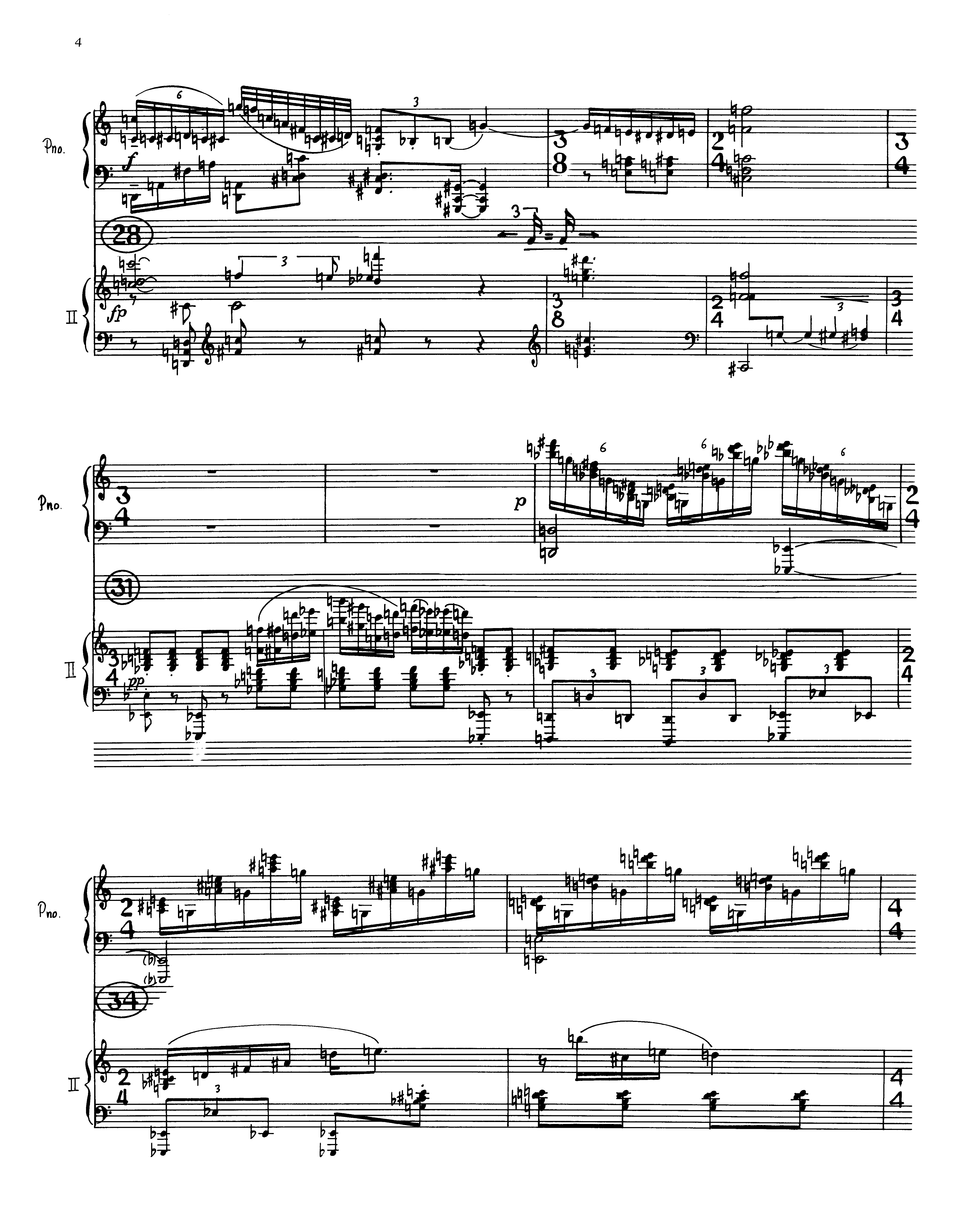Tobias Picker
Keys to the City
version for two pianos
(1983)| Duration | 18' |
|---|---|
| Commission | Commissioned by the City of New York in commemoration of the 100th anniversary of the Brooklyn Bridge |
| Premiere | Original orchestral version: May 24, 1983; Brooklyn, New York, Fulton Ferry Landing; Brooklyn Philharmonic; Paul Dunkel, conductor; Tobias Picker, piano Two piano version: 1996; Bennington College, Vermont; with the composer as primary soloist and Allen Shawn on the secondary part |
| Technical requirements | Two scores are required for performance. |
| Publisher | Schott Music |
Media
Program Note
In September of 1982 I received a phone call from The Brooklyn Bridge Centennial Commission, an organization established by the City of New York, Edward I. Koch, Mayor. Hearing the word "commission" I immediately thought I was about to receive one. I was wrong. What I did receive was an invitation to submit a previously composed work for a contest to be judged "blind" -- or more accurately, "deaf". The winner would then be commissioned to compose a celebratory work in honor of the upcoming hundredth anniversary of the opening of the Brooklyn Bridge, a structure which itself had been fourteen years in the making, during which many men lost their lives. This work would be performed on May 24th 1983, a mere eight months later.
I was told that many older, distinguished composers would be competing and that Andy Warhol had already been commissioned to do the official poster for the occasion. There was to be a multi-million dollar sound and light show, and the most spectacular fireworks display in the history of the city. My immediate reaction was that I did not stand a chance. Now, at forty, I look back in amazement at the good fortune of a twenty-eight-year-old composer who at that time had his first symphony to finish for Edo de Waart and the San Francisco Symphony as well as another commission to compose a piece for narrator and orchestra, The Encantadas, for the Albany Symphony.
I told the caller that it was not my habit to participate in competitions and terminated the conversation abruptly.
The Brooklyn Bridge. What a masterpiece of construction! What a work of art! What composer would not find endless inspiration in this great subject? These thoughts went round and round in my mind that day after the phone call, and they kept me up half the night. Perhaps it was a combination of inspiration and the greedy eighties -- when more was more -- which caused my insomnia. Anyway, what harm could there be in sending a tape and a score of my first piano concerto, say?
The next day, I telephoned the Centennial Commission, and said that, if they would still have me I would, after all, like to be considered.
After a few weeks, another phone call. I had won the contest. I would be given full artistic freedom in selecting a medium for the piece. The glamour and elegance of Rhapsody in Blue and the evocation of New York's great composer, George Gershwin, impelled me toward the decision to compose another piano concerto. Besides, playing it myself would assure me a ring-side seat at the fantastic celebration, which promised to draw two million people to both shores of the East River, not to mention countless others watching on television. I felt pride in having been selected to associate my music with the Brooklyn Bridge -- to say nothing of having finally won a contest.
Thus began my romance with the Brooklyn Bridge. I read Hart Crane and McCullough's "The Great Bridge." I studied its history. Visiting the bridge at different times of day and night, I observed its structure, its content and its context. I watched the light play through cables composed of billions of strands of streel. I listened from the foot bridge to the whine of the cars below. I studied paintings, poems, and songs which had been made in tribute to the bridge over the years. I even gave a champagne party for my friends on it one starry midnight. And I composed furiously.
I had precious few months to write the piece, make a two piano version of it for a dedication ceremony of the United States Commemorative Postage Stamp and -- of course -- to learn the solo part.
Keys to the City is in one continuous, eighteen-minute movement. The intervallic structure of the piece is derived from the form of the bridge itself -- a series of interlocking twelve-tone rows based on the bridge's arches and curves. A collection of interrelated and connected episodes, which suggest to me the bridge in its various moods from dusk to dawn, bind everything together. The piece opens with an orchestral tutti in the key-region of B, what I think of as the key of darkness. The opening theme (the notes B, C#, E, C#, Eb, D) returns later as a ground bass, giving rise to a boogie-woogie cadenza in the piano which then infects the entire orchestra. After a series of subsiding sections, followed by a number of explosive bursts, the piece, having passed through every other key, arrives at Bb, the key of light.
The Brooklyn Bridge centennial celebration was a night I will never forget. But the actual first performance of Keys to the City -- outdoors, without a tent, (the bridge was closed to traffic for the first time in a hundred years so that a cascade of fireworks in the shape of a waterfall running the entire length of it could descend into the river below), under the Brooklyn Bridge at Fulton Ferry Landing -- was something of an anti-climax. After so much excitement and anticipation (Ronald Reagan was rumored, right up until moments before the party began, to be planning a surprise appearance by helicopter. As it turned out, a helicopter did float in -- but bearing Ed Koch and Alfonse d'Amato), with the East River filled with boats all tuned to one of the five AM radio stations simulcasting the proceedings, and the roar of the crowds, the sounds of the orchestra could scarcely be heard as they were caught up by the swirling wind (my music had to be held on the music stand with huge clothes pins) and disbursed into the night air. When the piece began, the flash-bulbs and cameras of photographers from twenty-seven countries standing right in front of the orchestra was louder in my ears than the brass section behind me whose fortissimo notes wafted into the vast sky above.
Being asked to compose the official work for the Brooklyn Bridge Centennial was a privilege, and composing Keys to the City for that occasion was a pleasure.
Keys to the City was originally composed as a tribute to the people who lived and died building the Brooklyn Bridge, and in recognition of the great art it has inspired for 100 years.
 0 items in your cart
0 items in your cart






